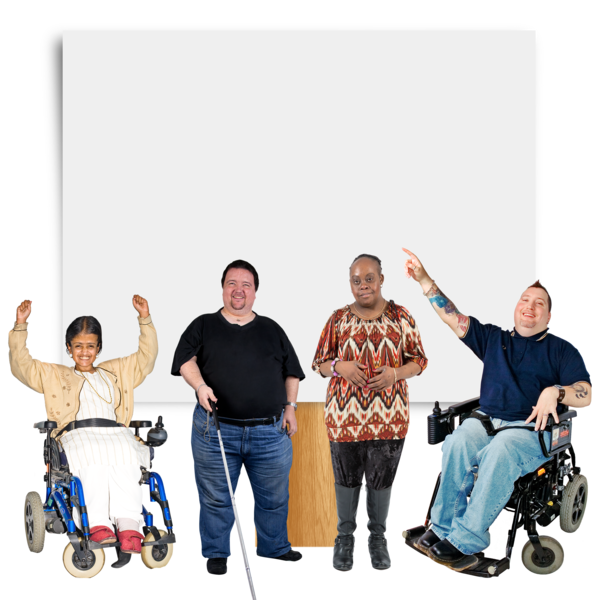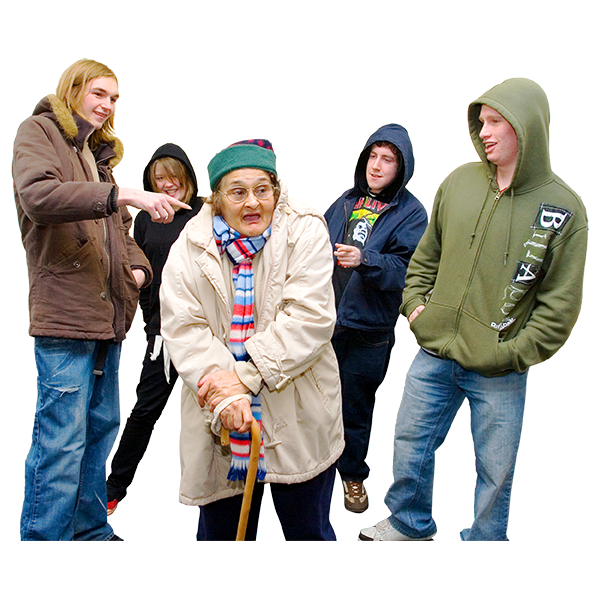Even before COVID-19, people with a
learning disability
 A learning disability is to do with the way someone's brain works. It makes it harder for someone to learn, understand or do things.
experienced shockingly high levels of health inequality – they were more likely to die avoidably and die younger.[i]
A learning disability is to do with the way someone's brain works. It makes it harder for someone to learn, understand or do things.
experienced shockingly high levels of health inequality – they were more likely to die avoidably and die younger.[i]
Despite this - and evidence early on that people with a learning disability are disproportionately affected by COVID-19 - Mencap’s report published today documents the stream of failures to protect one of the most marginalized patient populations in the country.
And with news this week that not all people with a learning disability will be prioritised for the COVID-19
vaccine
 A vaccine is medicine that helps your body to fight an infection in the future.
- despite people with a learning disability having died at over 6 times the rate of the general population[ii] – the report’s findings are more pertinent than ever.
A vaccine is medicine that helps your body to fight an infection in the future.
- despite people with a learning disability having died at over 6 times the rate of the general population[ii] – the report’s findings are more pertinent than ever.
Mainly detailing the situation in England, the report includes results from a
survey
 A survey is when someone asks you to answer some questions.
of learning disability nurses conducted at the height of the pandemic. It highlights the significant obstacles people have faced to accessing healthcare. Some people were told they would be denied life-saving treatment, and others had vital support removed, while some were discharged too early from hospital.
A survey is when someone asks you to answer some questions.
of learning disability nurses conducted at the height of the pandemic. It highlights the significant obstacles people have faced to accessing healthcare. Some people were told they would be denied life-saving treatment, and others had vital support removed, while some were discharged too early from hospital.
Key findings
In some instances, people with a learning disability were told that they may not receive life-saving treatment: The National Institute for Care Excellence (NICE) quickly changed original
guidance
 Guidance means being given clear instructions to be able to do something well.
in March this year which conflated support needs with frailty, resulting in Do not attempt cardiopulmonary resuscitation orders (DNACPRs) being placed on some disabled people’s records. However Mencap says that damage had already been done. Some GPs are reported to have told patients with a learning disability that they were unlikely to be offered ventilation and encouraged them to
consent
Guidance means being given clear instructions to be able to do something well.
in March this year which conflated support needs with frailty, resulting in Do not attempt cardiopulmonary resuscitation orders (DNACPRs) being placed on some disabled people’s records. However Mencap says that damage had already been done. Some GPs are reported to have told patients with a learning disability that they were unlikely to be offered ventilation and encouraged them to
consent
 Consent is when you say yes to something, like an operation, or Mencap using your photo for a story. You may have to sign something to say yes. If you can't make your own decisions, someone else can say yes or no for you. They must think about what is right for you.
to DNACPRs. Even now, Mencap is still receiving reports that DNACPRs are being placed on people’s records without their consent.
Consent is when you say yes to something, like an operation, or Mencap using your photo for a story. You may have to sign something to say yes. If you can't make your own decisions, someone else can say yes or no for you. They must think about what is right for you.
to DNACPRs. Even now, Mencap is still receiving reports that DNACPRs are being placed on people’s records without their consent.
“DNACPRs are constantly being put in place for people with a learning disability and often inappropriately… [We] challenge them daily but still these are happening.”
- Learning disability nurse, surveyed by Mencap in June/July 2020.
Some hospitals failed to provide adequate care while government guidance on visiting resulted in the removal of critical support: Reasonable adjustments – like more time during a medical appointment or being permitted to wait in a quiet area - are vital for people with a disability. Making reasonable adjustments is a requirement of the Equality Act 2010, a
law
 Laws are the rules that everyone in the country has to follow. If you don't follow the rules you can get in trouble with the police.
that remained in place throughout the pandemic, but despite this many people have found themselves unsupported with adjustments being limited during the COVID crisis.
Laws are the rules that everyone in the country has to follow. If you don't follow the rules you can get in trouble with the police.
that remained in place throughout the pandemic, but despite this many people have found themselves unsupported with adjustments being limited during the COVID crisis.
For someone with a learning disability who may face difficulties communicating, having the right person there to provide support is crucial. Yet the original official guidance was interpreted in different ways - even within the same hospital setting – often leaving people with a learning disability without vital support and at risk of worse health outcomes. In one case support was denied even when travelling to hospital in an ambulance.
“Our real worry and concern is that if my daughter has to be admitted to hospital for whatever cause or condition then we dread that it will be to her demise. If we as parents cannot be with her and she refuses support, and we are not able to give support or encourage her, then she will die.”
- Roy, whose daughter has a learning disability
“I was in and out of hospital many times from December last year up to August this year… Back in December I had one of my family by my bed most of the day. This was comforting and helped me deal with questions from doctors and nurses. But when I went into hospital in June this year in the middle of the COVID pandemic things were very different… The staff are doing incredible work helping people every day under very difficult circumstances, but when they interpret the rules differently this causes real difficulties for patients with a learning disability and can affect their quality of treatment.”
- Peter, who has a learning disability
Reduction in access to learning disability nurses: Some acute learning disability nurses were redeployed to other units. Learning disability nurses are crucial in ensuring people get the vital healthcare support they need, as well as providing support to other healthcare professionals. 11% of acute learning disability nurses surveyed by Mencap said they or a team member had been redeployed; for
community
 A community is the people and places in an area.
based learning disability nurses it was 34%.[iii]
A community is the people and places in an area.
based learning disability nurses it was 34%.[iii]
“I was redeployed for four weeks to [another] ward. During this period there was no specialist learning disability service provided across the Trust.”
- Learning disability nurse, surveyed by Mencap in June / July 2020.
Inappropriate discharge from hospital: Discharge guidance has meant that in many cases leaving hospital has happened too quickly with people returning home sooner than they would under normal circumstances, and sometimes with emergency readmissions following soon afterwards. Over half (57%) of the learning disability nurses surveyed by Mencap agreed that healthcare professionals have not always had enough time to ensure the right support is in place for patients with a learning disability upon discharge.[iv]
‘I wasn’t happy because I didn’t think I was well enough for discharge. Me and my sister knew that it was too early. I said I’m not well enough and they said I was fit enough to go home and that I was going to be discharged, but a few days later I was back in there.”
– Leroy, who has a learning disability
The impact of remote consultations: The widespread shift to remote GP and other medical consultations means that GPs can sometimes miss when a person with a learning disability is very unwell, either due to communication issues or because they attribute the person’s symptoms to their learning disability. This can cause delays in accessing healthcare and in some cases may have contributed to serious illness, and may be part of the reason that some people died.
What needs to happen now?
Long before COVID-19, Mencap’s Treat me well
campaign
 A campaign is when people work together to try to change something.
– which launched in February 2018 - has aimed to transform how the NHS treats people with a learning disability. Today’s report shows that the COVID pandemic has made this even more critical.
A campaign is when people work together to try to change something.
– which launched in February 2018 - has aimed to transform how the NHS treats people with a learning disability. Today’s report shows that the COVID pandemic has made this even more critical.
Mencap is calling for:
-
The government
 The Government are the people who run the country. The Government decide how much tax people should pay and how things like the National Health Service (NHS) should work.
to prioritise vaccination for all people with a learning disability, as people with a learning disability have died from COVID at up to 6 times the rate of the general population
The Government are the people who run the country. The Government decide how much tax people should pay and how things like the National Health Service (NHS) should work.
to prioritise vaccination for all people with a learning disability, as people with a learning disability have died from COVID at up to 6 times the rate of the general population - Clearer healthcare guidance that specifically addresses the needs of people with a learning disability
- Reasonable adjustments to be made where possible - these can be a matter of life and death
- DNACPRs to be reviewed and removed from the records of patients who did not give informed consent, or where proper decision making did not take place
- An urgent review to take place into the impact of remote consultations on people with a learning disability
- The forthcoming inquiry into the handling of the pandemic to look closely at why so many people with a learning disability lost their lives
- Prioritising training to ensure that all healthcare workers are confident in providing flexible, personalised care for people with a learning disability within their area of specialty.
Edel Harris, Chief Executive of the learning disability charity Mencap, said:
“With widespread inequality as a backdrop, when the healthcare sector was hit by the COVID-19 pandemic it resulted in a range of new and worsened problems for people with a learning disability. NHS staff have been working incredibly hard and doing everything possible to keep people safe but this is against a backdrop of inadequate and confusing guidance that has ultimately failed to protect people with a learning disability.
“Despite knowing the healthcare inequalities that people with a learning disability already face – and knowing early on that people with a learning disability were being disproportionately affected by the crisis – the UK Government has failed to produce guidance that adequately considers their needs. Because of this, there has been a failure to tackle the existing systematic lack of inclusion.
“Health inequalities can no longer be ignored. The current crisis is a wake-up call that must result in urgent system change to address the shocking levels of premature death and health inequalities that people with a learning disability continue to face. And this change must start with prioritising people with a learning disability for the COVID vaccine.”
To find out more about Mencap’s ‘My Health, My Life’ report, visit: mencap.org.uk/myhealthmylife.
-ENDS-
For further information, contact Mencap’s media team on: media@mencap.org.uk or 020 7696 5414 (including out of hours).
Notes to editors
[i] University of Bristol (2020) The Learning Disability Mortality Review (LeDeR) Programme Annual report 2019.
LeDeR’s report shows that people with a learning disability died from an avoidable medical cause of death twice as frequently as people in the general population (44% of deaths of people with a learning disability; 22% of deaths in the general population). And data also suggests that the disparity between the age at death for people with a learning disability (age 4 years and over) and the general population (all ages) in 2019 was 22 years for males and 27 years for females.
[ii] Public Health England (2020) COVID 19 deaths of people identified as having learning disabilities: summary. These figures are based on deaths reported the Disabilities Mortality Review (LeDeR) programme, and deaths in hospitals from NHS England’s COVID-19 Patient Notification System (CPNS), and are adjusted for under-reporting. Standardising for age and sex, the rate of COVID-19 deaths notified to LeDeR, from 21st March to 5th June 2020, was 4.1 times the rate for the general population. Adjusting this for under-reporting, the rate is estimated at 6.3 times the general population rate.
[iii] Mencap Learning Disability Nurse Survey (2020). Mencap ran a survey with 239 learning disability nurses working in an acute hospital or community based role. The survey ran for 2 weeks from 17/06/2020 to 01/07/2020.
[iv] Mencap Learning Disability Nurse Survey (2020)
About Mencap
There are 1.5 million people with a learning disability in the UK. Mencap works to support people with a learning disability, their families and carers by fighting to change laws, improve services and access to
education
 Education is when you learn things. When you fill in a form to get a job, education means you write where you went to school, college or university.
,
employment
Education is when you learn things. When you fill in a form to get a job, education means you write where you went to school, college or university.
,
employment
 Employment means having a job.
and
leisure
Employment means having a job.
and
leisure
 Leisure is when you have time to do things you enjoy like playing sports or going to the pub.
facilities. Mencap supports thousands of people with a learning disability to live their lives the way they want.
Leisure is when you have time to do things you enjoy like playing sports or going to the pub.
facilities. Mencap supports thousands of people with a learning disability to live their lives the way they want.
Visit: www.mencap.org.uk.
For advice and information about learning disability and Mencap services in your area, contact Mencap’s Learning Disability Helpline on 0808 808 1111 (10am-3pm, Monday-Friday) or email helpline@mencap.org.uk.
Treat me well campaign
In 2018, Mencap launched our Treat Me Well campaign to help save lives and to transform how the NHS treats people with a learning disability in hospital.
It is estimated 1,200 people with a learning disability die avoidably every year when timely access to good quality care could have saved them. While people with a learning disability die on average over two decades younger than people without a learning disability.
Over ten years after Mencap highlighted the issue of people with a learning disability dying avoidably (PDF), Mencap’s Treat me well campaign is working with healthcare professionals and campaigners to change that.
Working alongside healthcare professionals and campaigners like Paula McGowan, mother to Oliver McGowan who died in hospital, the Treat me well campaign has succeeded in securing
mandatory
 Mandatory means that something must be done.
learning disability training for all health professionals which is named in honour of Oliver – The Oliver McGowan Mdantory Training in Learning Disability and
Autism
Mandatory means that something must be done.
learning disability training for all health professionals which is named in honour of Oliver – The Oliver McGowan Mdantory Training in Learning Disability and
Autism
 Autism is a disability. Autistic people find it difficult to understand what other people think and feel. They also find it difficult to tell people what they think and feel. Everyone with autism is different.
- and will be piloted shortly.
Autism is a disability. Autistic people find it difficult to understand what other people think and feel. They also find it difficult to tell people what they think and feel. Everyone with autism is different.
- and will be piloted shortly.
Simple changes in hospital care can make a big difference – better communication, more time and clearer information.
But we know the treatment that people with a learning disability get in hospital is still not good enough in many parts of the country. This has to change.
Our Treat me well campaign is working with healthcare professionals and campaigners to make sure people with a learning disability are treated equally in hospital and get the healthcare they need and have a right to which can help to save lives.
What is a learning disability?
- A learning disability is a reduced intellectual ability which can cause problems with everyday tasks – for example shopping and cooking, or travelling to new places – which affects someone for their whole life
- Learning disability is not a mental illness or a learning difficulty, such as
dyslexia
 Dyslexia is a learning difficulty. People who have dyslexia can find it hard to read, write and spell.
. Very often the term ‘learning difficulty’ is wrongly used interchangeably with ‘learning disability’
Dyslexia is a learning difficulty. People who have dyslexia can find it hard to read, write and spell.
. Very often the term ‘learning difficulty’ is wrongly used interchangeably with ‘learning disability’ - People with a learning disability can take longer to learn new things and may need support to develop new skills, understand difficult information and engage with other people. The level of support someone needs is different with every individual. For example, someone with a severe learning disability might need much more support with daily tasks than someone with a mild learning disability.

